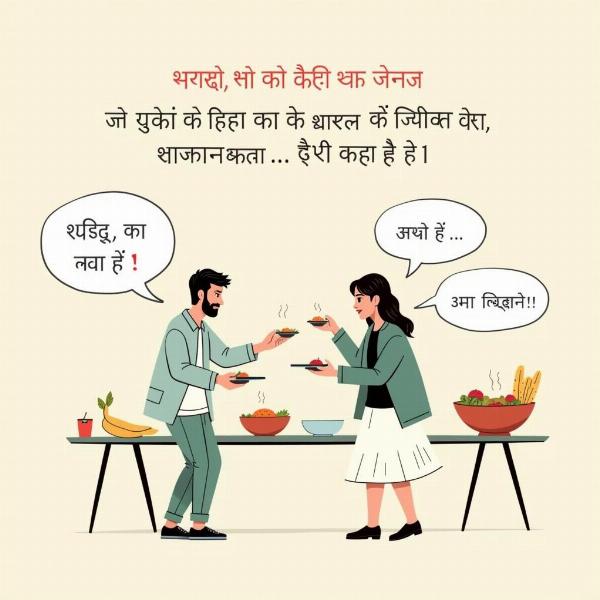Understanding the phrase “I have been eating” requires a grasp of the present perfect continuous tense, a grammatical structure that often trips up non-native English speakers, particularly those learning Hindi. This tense signifies an action that began in the past and continues into the present. So, “I have been eating” implies that the act of eating started some time ago and is still ongoing. Finding the perfect Hindi equivalent requires navigating the nuances of Hindi verb conjugation and aspect.
Decoding “I Have Been Eating” in Hindi
Several Hindi translations can accurately convey the meaning of “I have been eating,” depending on the specific context and emphasis. Let’s explore the most common and accurate options:
- मैं खा रहा हूँ (Main kha raha hun): This is the present continuous tense in Hindi and is often the closest equivalent. It translates to “I am eating.” While it doesn’t explicitly indicate the duration of the action, it’s frequently used in casual conversation where the ongoing nature of the action is understood.
- मैं खाता जा रहा हूँ (Main khata ja raha hun): This phrase adds a sense of continuation to the action. “Ja raha hun” implies a progressive action, making this translation closer to the continuous aspect of the English phrase.
- मैं कुछ देर से खा रहा हूँ (Main kuch der se kha raha hun): This translation emphasizes the duration, translating to “I have been eating for a while.” “Kuch der se” signifies “for some time” or “for a while.” This option is best suited when you want to highlight that the eating has been happening for a specific period.
Choosing the Right Translation
The most appropriate Hindi translation for “I have been eating” depends heavily on the context. For example:
- Scenario 1: Someone asks, “Are you hungry?” You reply, “I have been eating.” Here, “मैं खा रहा हूँ (Main kha raha hun)” is perfectly acceptable.
- Scenario 2: Someone comments on how much food you’ve consumed. You reply, “I have been eating for hours.” Here, “मैं कुछ देर से खा रहा हूँ (Main kuch der se kha raha hun)” or “मैं घंटों से खा रहा हूँ (Main ghanton se kha raha hun – I have been eating for hours)” is more accurate.
Common Mistakes to Avoid
A common mistake is directly translating the English structure into Hindi, which often results in grammatically incorrect and unnatural-sounding sentences. Avoid using literal translations like “मैं खाया रहा हूँ,” which doesn’t convey the intended meaning.
Beyond the Basics: Adding Nuance
Hindi offers a rich vocabulary to express subtle differences in meaning. For example, you can replace “khana (खाना)” with more specific verbs like “naashta karna (नाश्ता करना)” for breakfast, “khana karna (खाना करना)” for lunch/dinner, or “peena (पीना)” for drinking.
Why Understanding Tense Matters
Accurate tense usage is crucial for clear communication. Using the wrong tense can lead to misunderstandings, especially when discussing ongoing actions. Mastering the present perfect continuous tense, and its Hindi equivalents, is essential for fluency and effective communication.
Have You Been Eating…? Exploring Related Questions
How do you say “Have you been eating well?” in Hindi?
A common way to ask this is: “क्या आप अच्छा खा रहे हैं? (Kya aap achcha kha rahe hain?)”
What about “What have you been eating?”
You can ask this as: “आप क्या खा रहे थे? (Aap kya kha rahe the?)” (past continuous) or “आप क्या खाते रहे हैं? (Aap kya khate rahe hain?)” (present perfect continuous).
Conclusion: Mastering “I Have Been Eating” in Hindi
“I have been eating,” seemingly simple, requires careful consideration in Hindi. By understanding the nuances of tense and aspect, and selecting the appropriate translation based on context, you can communicate effectively and avoid common pitfalls. Remember to focus on conveying the intended meaning rather than resorting to literal translations. This understanding will significantly enhance your ability to communicate effectively in Hindi.
 Hindi Conversation about Food
Hindi Conversation about Food
FAQs
-
What’s the difference between “Main kha raha hun” and “Main khata ja raha hun”? While both indicate ongoing action, “khata ja raha hun” adds a sense of progression and duration.
-
Can I use “Main kha raha hun” to mean “I have been eating”? Yes, in casual conversations where the ongoing nature is implied.
-
Is there a single perfect translation for “I have been eating”? No, the best translation depends on the context and desired emphasis.
-
Why is literal translation problematic? It can lead to grammatically incorrect and unnatural-sounding Hindi sentences.
-
Where can I find more resources on Hindi grammar? Numerous online resources and textbooks offer comprehensive guidance on Hindi grammar and vocabulary.
About Meaning-Hindi.in
Meaning-Hindi.in is your trusted partner for professional Hindi translation services, catering to diverse needs, from business documents and legal papers to technical manuals, website localization, and educational materials. Our expert team ensures accurate and culturally sensitive translations, facilitating seamless communication across languages. We also offer specialized translation services in various fields, including business, legal, technical, website localization, and education, ensuring your message resonates with your target audience. Contact us today for a free quote and experience the difference of professional Hindi translation. Email: [email protected], Phone: +91 11-4502-7584. Let Meaning-Hindi.in be your bridge to connect with the Hindi-speaking world.